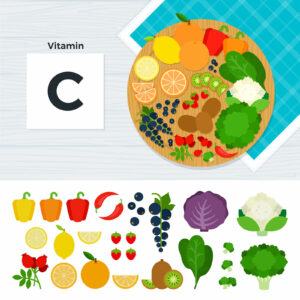What Is Vitamin C and What Can It Do?
Vitamin C is also called ascorbic acid.
It is a water-soluble nutrient
that can be found in various types of food.
Vitamin C is a crucial vitamin
to help prevent diseases and
boost your immune system and
it acts as an antioxidant as well.
Vitamin C helps to produce a protein
in the body called collagen.
No, this is not the type of collagen
that celebrities pump into their lips.
This collagen is needed by our body
to heal wounds.
Without it,
scrapes and cuts would never scab and
they’d remain open wounds
that can be easily infected.
Collagen is the most abundant substance in the body
and can be found in the skin,
bones and in connective tissues.
Young bodies produce a lot of collagen,
but as we age our collagen production levels drop dramatically.
Vitamin C is important especially for those in their older age to help the body produce collagen that their body is no longer producing naturally. This can keeps bones strong, help wounds heal faster and may even reduce sagginess of the skin. Why do you think so many anti-wrinkle creams advertise their high levels of vitamin C and collagen?
Vitamin C isn’t just great for producing collagen; it also helps the body properly absorb iron. If our bodies can’t properly absorb iron we risk developing anemia which can cause fatigue and other health problems.
A doctor once told me that the best thing to do when you have a cold is to drink lots of orange juice because of the high vitamin C levels. At the time I didn’t think anything of it, but now I can definitely understand just how important this underrated vitamin is.
Most people get their daily intake of vitamin C from beverages and a varied diet. However, some people who don’t have access to a varied diet or who are exposed to a lot of second hand smoke may be at risk of developing a vitamin C deficiency, which is also called scurvy.
No doubt you’ve heard about scurvy before. It’s the classic pirate disease. The reason scurvy is often associated with pirates is because on pirate ships there would be very limited food in terms of variety. They would eat whatever they could get their hands on and often it wasn’t anything healthy
As a result many pirates developed scurvy, which opened their weak immune systems to be attacked by various diseases. You may not be a pirate, but that doesn’t mean you can’t develop scurvy. Some symptoms to look out for are bleeding gums (gingivitis), frequent nosebleeds, slow healing time and rough or dry skin.
An apple a day has never been truer.
Vitamin C and Vision
 I guess you could call vitamin C “vitamin SEE” because it has just as much influence on our vision health as vitamin A! We’ve already established that vitamin C is needed by our bodies, especially as we age. That being said, vitamin C is the best vitamin for promoting healthy eyes as we age as it targets two age-related diseases: AMD and cataracts.
I guess you could call vitamin C “vitamin SEE” because it has just as much influence on our vision health as vitamin A! We’ve already established that vitamin C is needed by our bodies, especially as we age. That being said, vitamin C is the best vitamin for promoting healthy eyes as we age as it targets two age-related diseases: AMD and cataracts.
AMD or age-related macular degeneration is a disease that occurs when the macula begins to, well, degenerate. Overtime this will affect almost everyone. It’s a natural part of aging, but that doesn’t mean we can’t slow down the process to keep our vision healthy, longer.
A study done by the National Eye Institute found that patients who took vitamin C supplements along with beta-carotene, vitamin E and zinc supplements slowed the progression of AMD by 25 percent!
If that didn’t amaze you enough, just wait until you hear about this next study. Women who had been taking vitamin C supplements for 10 years or more saw a 64 percent decrease in the risk of developing cataracts.
That means that by delaying cataracts for 10 years these women were able avoid half the surgeries that are often recommended to remove cataracts! The less surgery, the better!
Where Is Vitamin C Found?
Vitamin C is most commonly found in foods and various drinks. However, it can also be found in supplement form.
There are a couple of different kinds of supplements. Vitamin C comes in a typical pill form, it comes in a powder form to be stirred into drinks or it comes in an all-inclusive supplement like our Ocu-Plus Formula.
Though our bodies need quite a bit of vitamin C because our bodies do not produce it, it’s easy to get carried away and take too much vitamin C. Though the consequences of too much vitamin C are not as dangerous as something like zinc, which could be toxic, it does lead to some mild discomfort.
Too much vitamin C can result in nausea, diarrhea and maybe stomach cramps. Don’t worry too much about having too much vitamin C, it isn’t harmful.
Foods High in Vitamin C
Taking a vitamin C supplement is great, but you might want to couple that with a balanced diet of foods high in vitamin C. Here are some of our favorites:
- Oranges and orange juice
- Apples
- Kiwi
- Papaya
- Dark leafy greens
- Most citrus fruits
- Strawberries
There are a ton of foods out there that are high in vitamin C, which makes it super easy to work into our diets. Vitamin C helps to ward off disease, heal our bodies naturally, and keep our vision sharp and clear well into our old age.
Never, ever underestimate the power of a glass of orange juice.